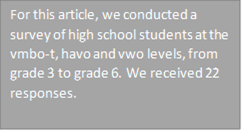Living Online During the Pandemic
Online education: not just a curse?
Written by Amy Scheren
All you need to do is scroll through the news, and you will likely see an article or post about it. How will education be affected after months of online teaching due to the COVID-19 pandemic? Teachers and experts are now worried about a new crisis lurking: huge learning gaps, especially in primary education. Instead, when it comes to high school students, the news mainly reports serious mental health issues, such as burnouts, depression and increased loneliness. But what about the learning performance in secondary education?
A NOS Stories poll from July 2020 revealed that, out of the 3,000 participating students, at least 38% think they have fallen behind in learning due to online education. Julian, who is currently in 5 VWO, has been taking all of his classes online for the past few months. He affirms that he found this situation very difficult: “I had a lot of trouble sitting in front of my laptop every day and concentrating on my classes. Moreover, I got a lot of homework in addition compared to the ‘normal‘ classes, and I missed my friends very much.” Julian is still allowed to pass to the next school year at the moment, but he is worried. Even on TV talk shows, school principals talk about dramatic test scores and large backlogs; there are also many calls for adjustments to final exams.
But is there really a learning delay? The first scientific studies conducted in New Zealand, Germany, Ireland and the United Kingdom, show that high school students feel less motivated when they are taught at home than when they can go to school. But that does not necessarily mean that they are experiencing learning failure. Research in several European countries, including the Netherlands, has shown little evidence that high school students have suffered major learning disadvantages during their study at home. For example, in early 2021, researchers at the University of Groningen found that, despite a significant decrease in the amount of time students spent studying at home, they were well on track compared to past years. In fact, some students now score even better when answering open-ended questions in a test. Scientists think that one of the reasons for this is that students could concentrate better at home and experienced less time pressure.
Motivation from within
When you take online education, you have more freedom in planning your day than you have at school. This allows you to work independently and at your own pace. You need to make sure you finish your homework, but you also have more time to work on it and schedule it yourself. When you, as a student, feel free to complete an assignment without outside pressure, your own motivation increases. Researchers at the University of Rochester showed in 2000 that higher self-motivation leads to better learning and performance.

Following online education, © Julia M. Cameron – Pexels
Differences among students
Yet, in the NOS stories poll, but also in our survey, students indicated that they were less able to learn at home. How is that possible?

Well, it is because there are large differences between pupils. The home situation of the student plays a major role. Just imagine having to follow a difficult subject while the Wi-Fi is down every fifteen minutes or your little sister keeps screaming because she wants to use the laptop. You really can’t concentrate well like that, can you? Our survey answered by Dutch high school students also revealed that one participant provided informal care for a family member while taking online education, leading to frequent distraction during class. Of course, these kinds of disruptions that some experience can get in the way of the learning process.
The role of the teacher
Your teacher also has an influence on how well you can learn during online education. Researchers from Utrecht University of Applied Sciences showed in late 2020 that within a group of 200 Dutch teachers (including secondary school teachers), the lack of interaction during online teaching was perceived as the biggest disadvantage. The interaction between teachers and students is actually very important for the learning process. However, as this same study shows, not all students suffered from this problem. Some introverted students were suddenly more present and active during online classes than in the classroom. Therefore, for certain students, online education may be better for their learning.
To teach online well, the teacher must be able to handle digital technology. The rapid switch to distance education required teachers to adapt their teaching style, which was more difficult for some. In any case, this mandatory switch in teaching style has ensured that teachers now see how useful technology can be. Educational consultant Mirthe Mangnus of Utrecht University notes that this is true even for teachers who teach university courses. “Before the pandemic, everyone had used Skype or Facetime, but for some, it stopped there.” she says – “Teachers have now been able to see how much potential online teaching tools have, and that it does not always mean that it will increase their workload.” Mangnus also claims that teachers at university are now sharing knowledge, lesson ideas and experiences with each other, whereas this was not so common before. This could lead to innovation in teaching. Research confirms that Dutch teachers in primary, secondary and higher education intend to integrate the use of technology in their lessons, even when they will able to teach in the ‘normal’ way again.

Teachers and technology.
How to proceed?
In short, by using online education, teachers and students have learned a lot during this pandemic. Despite all the concerns, the learning deficit incurred by high school students does not seem to be that great. In fact, by pursuing distance education, students were given more freedom and experienced less time pressure. Also, the COVID-19 pandemic has made teachers better at applying digital technology during their classes. How long schools will remain open now is uncertain, but either way (some form of) online education will become more common. By better applying online education in the future, it will become not only a curse, but also a blessing.
Translated from Dutch
Sources
Survey conducted among Dutch high school students at the VMBO, HAVO and VWO levels (grade 3 to grade 6)
Interview with Julian, a Dutch high school student from class 5, VWO
Interview with Mirthe Mangnus, educational advisor at Utrecht University
NOS (2020, juni 22), ‘De consequenties van online lessen: nu heb ik een 4 voor wiskunde’. https://nos.nl/artikel/2338165-deconsequenties-van-online-lessen-nu-heb-ik-een-4-voor-wiskunde.html
Van der Heyden, W. (2020, november 5). Van een 6,3 naar een 3,5 gemiddeld: leerachterstanden op middelbare scholen dramatisch door corona. EenVandaag, https://eenvandaag.avrotros.nl/item/van-een-63-naar-een-35-gemiddeld-leerachterstanden-op-middelbare-scholen-dramatisch-door-corona/
Scientific sources
Dietrich, H., Patzina, A., & Lerche, A. (2021). Social inequality in the homeschooling efforts of German high school students during a school closing period. European Societies, 23(sup1), S348-S369.
Grätz, M., & Lipps, O. (2021). Large loss in studying time during the closure of schools in Switzerland in 2020. Research in Social Stratification and Mobility, 71, 100554.
Korkmaz, G., & Toraman, Ç. (2020). Are we ready for the post-COVID-19 educational practice? An investigation into what educators think as to online learning. International Journal of Technology in Education and Science (IJTES), 4(4), 293-309.
Pelikan, E. R., Lüftenegger, M., Holzer, J., Korlat, S., Spiel, C., & Schober, B. (2021). Learning during COVID-19: the role of self-regulated learning, motivation, and procrastination for perceived competence. Zeitschrift für Erziehungswissenschaft, 1-26.
Ryan, R. M., & Deci, E. L. (2000). Intrinsic and extrinsic motivations: Classic definitions and new directions. Contemporary educational psychology, 25(1), 54-67.
van der Spoel, I., Noroozi, O., Schuurink, E., & van Ginkel, S. (2020). Teachers’ online teaching expectations and experiences during the Covid19-pandemic in the Netherlands. European journal of teacher education, 43(4), 623-638.
van der Velde, M., Sense, F., Spijkers, R., Meeter, M., & van Rijn, H. (2021). Lockdown Learning: Changes in Online Study Activity and Performance of Dutch Secondary School Students during the COVID-19 Pandemic.
Yates, A., Starkey, L., Egerton, B., & Flueggen, F. (2020). High school students’ experience of online learning during Covid-19: the influence of technology and pedagogy. Technology, Pedagogy and Education, 1-15.

